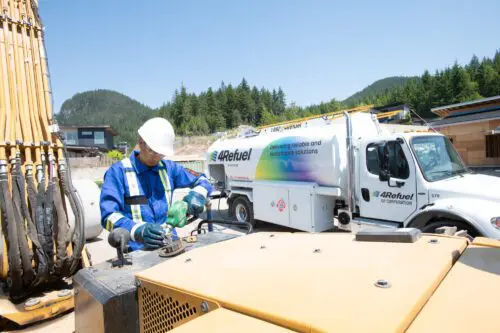24/7/365 mobile on-site delivery of biodiesel.
Alternative
WHAT IS BioDIESEL?
Biodiesel, also known as FAME, and renewable diesel, also known as HDRD, are turnkey options that reduce lifecycle greenhouse gas emissions while allowing you to use your existing diesel-powered engine and equipment.
Biodiesel, often referred to as FAME (fatty acid methyl ester) is considered a renewable energy source, produced from organic matter or biomass such as corn, sugar, vegetable oils, or waste feedstocks through a process called transesterification. Biodiesel must be blended with traditional diesel and is offered in blends of B-5 and B-20 (5% and 20% biogenic).

BENEFITS OF BIODIESEL
-

Can be used in OEM approved engines -

Higher flashpoint which makes it safer if spilled -

Improved lubricity -

High cetane number -

Lower sulphur and aromatics -

Products meet Canadian fuel standards (CGSB 3.517) and American fuel standards (ASTM D975) -

Bio-genic C02 portion exempt from Scope 1 emissions (as per GHG Protocol Framework)
Emissions: B20 fuel offers lower CO2 lifecycle emissions when compared to traditional diesel, helping operations lower Scope 1 greenhouse gas emissions.
Products meet Canadian fuel standards CGSB 3.520 (B1-B5) and CGSB 3.522 (B6-B20) and American fuel standards ASTM D975 (B0-B5) and ASTM D7467 (B6-B20)
Key note: Biodiesel has a cloud point of O degrees Celsius +/- 5 degrees Celsius making it a ‘seasonal’ product that cannot be used, nor is available, during cold months.
*Disclaimer: Lifecycle GHG emissions refer to the emissions that occur during each stage of the fuel’s lifecycle, including but not limited to the production, transportation and end-use of the fuel. Any emissions values referenced are based on carbon intensity (gCO2e/MJ) figures provided by 4Refuel Suppliers for each low carbon fuel type and are subject to change. The GHG emissions reductions are calculated by comparing the Carbon Intensity of the lower carbon fuels blends sold to the baseline Carbon Intensity of conventional diesel of 93 gCO2 e/MJ (as published in Canada’s Clean Fuel Regulations).